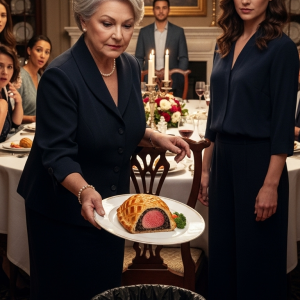Margaret Harrison believed that a person’s worth could be measured by the pedigree of their possessions. Her world was a carefully curated collection of brand names and old family money. Her son, Liam, was her most prized asset, and his choice of a fiancée, Grace Miller, was, in Margaret’s eyes, a catastrophic misstep. Grace was lovely, of course, but she was a nobody, a girl with a “hobby,” not a heritage.
The “hobby” was fashion design. Grace’s small spare bedroom had been converted into a studio, a chaotic, beautiful space filled with bolts of silk and lace, dress forms draped in muslin, and sketchbooks overflowing with her elegant, innovative designs. To Margaret, it was a glorified sewing room.
Three months before the wedding, Margaret had begun a campaign of unusual interest. She would appear at their apartment unannounced, bearing gifts, her eyes scanning the studio with a predatory curiosity.
“Just wanted to see how my favorite little seamstress is doing!” she’d chirped, her voice dripping with false sweetness as she peered at a sketch on Grace’s desk. “Oh, is that it, dear? Your little wedding dress project? It’s all very… quaint. I do hope you have a respectable designer on standby. A wedding is a major social event, not a home economics project.”
Grace would just smile, a quiet, non-committal smile. But she was not naive. She saw the way Margaret’s eyes lingered on her designs, the way she asked overly specific questions about fabrics and construction. She saw the gears turning behind the woman’s perfectly made-up face.
After one particularly intrusive visit, where Margaret had insisted on taking a photo of a sketch to “show her garden club friends your cleverness,” a cold, hard suspicion began to form in Grace’s mind. That evening, she made a phone call.
“Isabella Rossi, please,” she said, her voice steady. She was calling the office of the legendary editor-in-chief of Vogue, a woman known for her discerning eye and her championing of new talent. Grace had managed to secure a brief, informational interview with a junior editor months ago, a small foothold in a world that seemed impossibly distant. Now, she was leveraging it.
“Ms. Rossi, my name is Grace Miller,” she began when the formidable editor came on the line. “You don’t know me, but I am getting married in three months. And I have a feeling my wedding is going to be a fashion event you won’t want to miss. I’m sending you a personal invitation.” It was the boldest move of her life, a preemptive strike in a war she suspected was about to be declared.
Part 2: The Original
The morning of the wedding was a symphony of soft light and happy, nervous energy. Grace stood in front of a full-length mirror, a vision in silk and lace. The dress was her soul, made manifest. It was a masterpiece of her own design and her own two hands, the culmination of a thousand hours of sketching, draping, and intricate, painstaking embroidery.
The gown was a testament to her unique vision. A classic A-line silhouette was modernized with an asymmetrical neckline and a cascade of hand-stitched, iridescent pearls that flowed down one side like a moonlit waterfall. The fabric, a heavy, liquid silk charmeuse, moved with a grace that no machine-made garment could ever replicate. It was not just a dress; it was a statement. The centerpiece of ‘Phoenix,’ her debut collection. Her heart.
Liam came into the room, his jaw literally dropping when he saw her. “Grace…” he whispered, his eyes full of a love and awe that made her heart sing. “You are… the most beautiful thing I have ever seen.”
He was a good man, kind and loving, but he was a man who had spent his life under the powerful, manipulative gravity of his mother. He knew she was “difficult,” but he didn’t, couldn’t, comprehend the true depth of her toxicity.
“I’m so glad you invited your journalist friend,” he said, straightening his tie. “The one from the magazine. It’s important for you to have your world represented here too.”
Grace smiled and kissed him. “Yes,” she said. “It’s very important.” He saw it as a work connection; she saw it as her star witness. She was ready. Whatever his mother was planning, Grace was ready.
Part 3: The Replica
The ceremony was held in a magnificent, sun-drenched botanical garden. As Grace walked down the aisle on her father’s arm, a collective gasp went through the assembled guests. The dress was a triumph. It was unique, elegant, a work of art. Grace felt a surge of pride, the culmination of her life’s dream. She reached the altar and took Liam’s hand, her heart full.
The ceremony was beautiful. The vows were heartfelt. The kiss was perfect. But as the newly married couple turned to face their cheering friends and family, a second, more audible gasp rippled through the crowd.
Walking down the aisle to take her place in the front row was Margaret Harrison. And she was wearing the same dress.
Or rather, it was an almost identical dress. A clumsy, garish echo of the original. The silhouette was the same, but the fabric was a cheap, shiny polyester that didn’t flow, but hung stiffly. The cascade of pearls was a spray of plastic beads, clumsily glued on. The exquisite, asymmetrical neckline was just a poorly tailored, crooked seam.
The effect was instantaneous and devastating. The guests fell into a stunned, horrified silence, punctuated by frantic whispers. It was a social atom bomb, an act of such breathtaking, malicious narcissism that no one knew how to react.
Liam froze, his face a mask of pure, unadulterated horror. He looked from his beautiful, unique bride to his mother, clad in her grotesque parody, and the full, monstrous reality of her character finally, truly, dawned on him. He was mortified, speechless.
But Grace did not cry. She did not scream. She did not look horrified. She simply looked at her mother-in-law, at the cheap imitation of her heart’s work, and she smiled. It was a calm, serene, and utterly terrifyingly knowing smile. The power in that moment shifted, completely and irrevocably, to the bride.
Part 4: The Speech
The wedding reception was an exercise in extreme social awkwardness. Guests avoided Margaret as if she were radioactive. Margaret, for her part, held her head high, believing her stunt had been a success. She had shown everyone that her daughter-in-law’s “unique” creation was just a common dress, and she had stolen the spotlight. She was basking in what she perceived as her victory.
Finally, it was time for the speeches. After the best man and maid of honor had offered their toasts, Grace herself stepped up to the microphone, her original dress shimmering under the lights. A hush fell over the room. Everyone was waiting for the tears, the drama, the confrontation.
“Thank you all so much for being here to celebrate with us,” she began, her voice ringing with a bright, joyful clarity that surprised everyone. “This day has been more memorable than I could have ever imagined.”
She smiled, a wide, genuine smile. “I have so many people to thank, but I want to give a very, very special thank you to my new mother-in-law, Margaret.” All eyes swiveled to Margaret, who preened, expecting a tearful concession of defeat.
“As some of you know,” Grace continued, “I am a fashion designer. For the past year, I have been pouring my heart and soul into creating my debut collection. I was so worried no one would see my work, but Margaret loved one of my designs so much, she decided to give all of you a surprise sneak peek today.”
A confused murmur rippled through the crowd. Margaret’s smug smile began to falter.
Grace looked directly at her mother-in-law, her voice still sweet, but now laced with a fine, sharp edge of steel. “You are wearing a truly stunning replica of my design, Margaret. The craftsmanship is… remarkable, for the price. I’m so flattered you chose my work to be your inspiration.”
Then, she turned back to the audience, her voice swelling with a new, professional confidence. “And for those of you who appreciate the original,” she said, gesturing to her own exquisite gown, the real pearls and silk catching the light, “I am thrilled to officially announce that my debut collection, entitled ‘Phoenix,’ will be launching next month.”
She paused, delivering the final, brilliant checkmate. “In your wedding programs, you will find a small QR code. Please, feel free to scan it for an exclusive, first look at the entire collection, and to pre-order your own original designs.”
In the back of the room, Isabella Rossi, the editor of Vogue, was not taking notes. She was recording the entire speech on her phone, a look of sheer, unadulterated delight on her face. This wasn’t just a story about a dress. This was the story of the birth of a star.
Part 5: The House of Grace
The aftermath was a thing of legend. Margaret Harrison’s social destruction was absolute. She had tried to humiliate her daughter-in-law and had instead branded herself a thief who wore cheap knock-offs to her own son’s wedding. The shame was so profound, so public, she didn’t leave her house for a month.
Liam, finally and irrevocably awakened to his mother’s true nature, confronted her the day after the wedding. It was a quiet, sad, and final conversation, in which he chose his wife, his marriage, and his own future, severing the toxic strings of manipulation for good. His apology to Grace was heartfelt and absolute, his awe for her intelligence and strength cementing their bond into something stronger than ever before.
But the true story was Grace’s ascent. The Vogue article, penned by Isabella Rossi herself, was a masterpiece. It was titled, simply, “The Phoenix Moment.” “In a move of sheer, breathtaking genius,” the article read, “newcomer Grace Miller turned what could have been a moment of profound personal humiliation into the most talked-about fashion debut of the decade. This was not just a wedding; it was a coronation.”
The QR code was scanned thousands of times. The “Phoenix” collection sold out on pre-order within twenty-four hours. Grace Miller became an overnight sensation, a symbol of resilience, talent, and brilliant strategy.
A year later, she stood in her new, bustling atelier in the heart of the fashion district. “Grace Miller Bridal” was the most sought-after label for brides who wanted something unique, personal, and artful. Her designs were celebrated for their craftsmanship and their story. Liam was there, no longer just a supportive husband, but her business partner, handling the logistics of their rapidly expanding empire.
She looked around at the beautiful chaos of her studio, at the sketches for her next collection, at the life she had built not in spite of the ugliness she had faced, but because of it. Her mother-in-law had tried to humiliate her, to reduce her life’s work to a cheap joke. Instead, she had handed her a global stage and the best marketing campaign a debut designer could ever dream of. Margaret hadn’t ruined her wedding day; she had, in the most ironic twist of all, been the unlikely, unwitting fairy godmother to her spectacular career.
A year later, the name Grace Miller was no longer a secret whispered among industry insiders; it was a brand, a symbol, a testament to the explosive power of talent meeting opportunity. The “Phoenix Moment,” as the press had dubbed it, had become the defining story of the fashion season. But for Grace and Liam, the real story was the quiet, steady work of building a life and a business from the ground up, together.
Their chic, sunlit loft apartment doubled as a creative headquarters. On one side, Grace’s studio was a beautiful, organized chaos of sketches, fabric swatches, and half-draped mannequins. On the other, Liam had set up a sleek, efficient office from which he managed the burgeoning business of the Grace Miller brand. He had left his soulless corporate job without a backward glance, finding a new, more profound purpose in championing his wife’s genius.
He was on the phone, his voice a calm, firm negotiator’s tone that Grace had come to admire. “No, I understand the timelines are aggressive,” he was saying to a textile supplier from Italy, “but this is for the Met Gala piece. For us, quality is not negotiable. Grace’s name is on that label, which means our promise is on it too.” He listened for a moment, then smiled. “Excellent. I knew we could count on you.”
He hung up and walked over to Grace’s drafting table, wrapping his arms around her from behind and kissing her shoulder. “The silk velvet for the gala gown is secured,” he murmured into her hair. “Now it’s up to the artist to work her magic.”
Grace leaned back into his embrace, a contented smile on her face. This was their new normal: a partnership built on a deep, shared respect for each other’s strengths. The memory of his panicked, helpless face at the wedding felt like a lifetime ago. He had stepped up, becoming the unwavering advocate and protector she had always known he could be. “Thank you, Mr. Miller,” she said, turning her head to kiss him. “Now, Mrs. Harrison’s husband, would you be so kind as to tell me if you prefer a beaded or an embroidered corset for this design?” Their shared laughter was the easy, happy sound of a team in perfect sync.
In a large, silent, and impeccably decorated house in the suburbs, Margaret Harrison was also on the phone. Her social circle, once a vast and glittering constellation, had shrunk to a few aging satellites who were still willing to listen to her litany of grievances.
“It’s the sheer audacity of it all, Patricia,” Margaret was saying, her voice a low, bitter whine as she stared at the latest issue of Harper’s Bazaar. Grace’s face, serene and confident, stared back at her from the cover. “She parades around as if she’s some kind of creative genius, but it was all just a publicity stunt. A cheap trick to get attention. And poor Liam… he’s completely brainwashed. Left a perfectly good career to be her… her assistant.”
She conveniently omitted the fact that Liam was the company’s CEO and that his “assistant” role had already doubled its valuation. In Margaret’s version of history, she was the victim, a loving mother whose thoughtful concerns had been twisted by a manipulative, fame-hungry social climber. The shame of that day had not humbled her; it had calcified her bitterness into an unshakeable, self-serving delusion.
“He doesn’t even call anymore,” she lamented, conveniently forgetting that she had hung up on him the last three times he had tried. “After all I did for him. It’s a mother’s tragedy.” She ended the call and was left alone in the crushing silence of her perfect house. The knock-off dress, a symbol of her spectacular miscalculation, was hidden in a box in the back of her closet, a constant, unspoken rebuke. She had tried to steal the spotlight and had been permanently cast into the shadows, a lonely ghost haunting the edges of a celebration she was no longer invited to.
The fashion industry gala was a dazzling affair, a sea of sequins, champagne, and the most powerful people in the business. Grace and Liam moved through the crowd not as newcomers, but as one of the evening’s main attractions. Grace’s dress, a stunning, deep sapphire velvet from her upcoming collection, was already causing a buzz.
They found themselves face-to-face with Isabella Rossi. The Vogue editor’s sharp, intelligent eyes crinkled in a genuine smile as she saw Grace. “My dear,” Isabella said, taking both of Grace’s hands. “The girl who launched a fashion empire with a wedding speech. You are looking at the future.”
“I had a little help from a well-placed article,” Grace replied warmly.
“Nonsense,” Isabella said with a dismissive wave. “I can write an article, I can open a door. I cannot create… that.” She gestured to Grace’s dress. “Your work speaks for itself. Which is why I wanted to talk to you. Paris Fashion Week. The American showcase. I want you to be the headline designer.”
Grace felt a dizzying surge of joy. It was the kind of offer she wouldn’t have even dared to dream of two years ago. She looked at Liam, who squeezed her hand, his eyes shining with pride. “We would be honored, Isabella,” Liam said, speaking for both of them.
Later, they stepped out onto a balcony overlooking the glittering city skyline. The noise of the party faded behind them, leaving them in a quiet bubble of their own.
“Paris,” Grace whispered, the word feeling like a magical incantation on her lips. “Can you believe it?”
“Of course I can,” Liam said, turning her to face him. “I can believe anything now. I watched you turn the worst day of your life into the best day of your career. You took my mother’s ugliness and you spun it into something beautiful and strong.”
Grace looked up at him, her heart full. She thought of the ‘Phoenix’ collection, the one born from the ashes of that humiliating moment. She had risen, not just from the insult, but from the years of being underestimated, of being told she was not enough. The fire had been meant to destroy her, but instead, it had just shown her how to fly.




